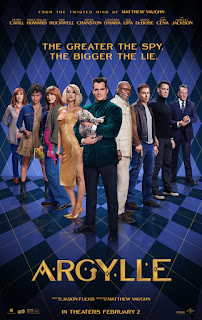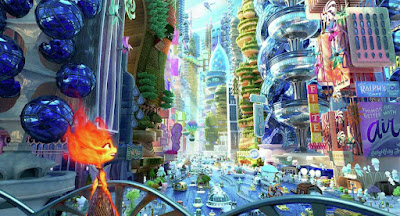or
"I Dont Think That I Can Take It/
'Cause It Took SO LONG to Bake It/
And I'll Never Have That Recipe Agaaaaain"
Beetlejuice was an unlikely hit when it debuted away back in 1988. Director Tim Burton was virtually unknown. He'd made two shorts, one called Vincent and the other, his live-action version of Frankenweenie, the second of which convinced Paul Reubens to give him the directing job on Pee-wee's Big Adventure. That one had made money and when Burton became friends with writers Michael McDowell and Larry Wilson after directing their modern re-telling of "The Jar" for the television anthology re-boot "Alfred Hitchcock Presents", they began collaborating on McDowell and Wilson's original screenplay "Beetlejuice". As closely identified as he is with the film, it did not start as an original idea—Burton had already been working on his next film, Batman with writer Sam Hamm, but the project hadn't gotten out of the Warner Brothers' development Hell, when the McDowell-Wilson script found its way to him.
Beetlejuice changed everything. Burton's bizarre approach to the material garnered a large audience, and seeing the success that the young director had made of such a strange concept, Warner was more than happy to finance Batman. And Tim Burton became, if not a household name, a guarantor of original concepts and oddly-tilted projects that audiences fancied.
A sequel to Beetlejuice has always been talked about...but Burton has always been busy. For the longest time, it had been going through a series of concepts from many Burton collaborators under such titles as "Beetlejuice Goes to Hell," "Beetlejuice in Love" and..."Beetlejuice Goes Hawaiian" (I think that might have been a joke-title for the press) but Burton always seemed to find something that attracted him more. Now, a whopping 36 years—and several Batmen—later, it's finally manifested itself in theaters. A bit of personal back-story here: I must confess that the first Beetlejuice movie...at first viewing...I wasn't that crazy about. Brilliantly designed, yes. Ingenious and funny, sure. Keaton, terrific...if used a bit sparingly. All the elements were there, but it just seemed a bit wanting. Some of it might be attributed to Alec Baldwin's performance—this was before he became "Alec Baldwin"—which was a little bland, almost protective of himself as an actor. But, the big thing is I got the impression that the movie wasn't exactly true to its own rules...like if something needed to be resolved, Burton would just come up with something and excuse it as "it'll work" rather than making sense. This was before I started to appreciate Burton as Burton.* With a couple more films, I learned to let Burton be Burton and my reservations blew away like dust that obscures a snow-globe. Oh, he could still do a less than satisfying film, but a fully-engaged Burton film is a joy to behold...and experience.Which is why I found Beetlejuice Beetlejuice such a breath of fresh air, albeit with a creepily crypt-like funk. One recalls that when Burton does a sequel—he's only done one, Batman Returns, far different in tone than the first one—he approaches it the same way he does one of his re-makes...as a "re-imagining." Yes, there will be call-backs (and there are plenty in Beetlejuice Beetlejuice), but, for the most part, Burton is vampire-staking new ground, and here he's doing it with such wild abandon that one turns giddy with each new development...however grisly or grotesque.
The story has three arcs that will progress and come together at the end.
1) It's 36 years later than the events of the first film and Lydia Deetz (Winona Ryder), the girl who could "see dead people," is the host of a cable-TV show called "Ghost House" where she visits haunted places. She has the experience. She is currently having the experience of seeing flashing visions of Betelgeuse (Michael Keaton)—well, he isn't "flashing" per se, but one wouldn't put it past him—which is making her more neurotic than normal and has her reaching for her anti-anxiety pills, much against the wishes of her producer/boyfriend Rory (Justin Theroux). Lydia is a mess, anyway. Her surrogate ghost-family, the Maitlands have "found a loophole" and moved on. Her husband, Richard (Santiago Cabrera) has disappeared exploring the Amazon, and her daughter, Astrid (Jenna Ortega), in boarding school, hates her, blaming her for driving her father away and because she considers her mother's work with the supernatural "a sham." Lydia's mother Delia (Catherine O'Hara) is now a popular artist with a gallery opening pending, when she learns that husband Charles () has died and she insists that the three generations of women return to their old home in Winter River for a proper memorial. 2) Betelgeuse is now a functionary in Afterlife Management, running a boiler-room of shrunken-head employees and still holding a torch for Lydia, when he is called off the job by "ghost detective" Wolf Jackson (Willem Dafoe), B-movie action star in his past life, who warns him that his past wife Delores (Monica Bellucci), a soul-sucking witch who murdered him during the Black Plague has somehow managed to reassemble herself—Betelgeuse hacked her into parts after discovering she'd poisoned him (it was the Plague Years, after all)—and is now seeking him out for revenge. Betelgeuse knows he won't out-run her for long and knows his only real salvation is to try to get back into the mortal world. 3) Astrid, on break from her boarding school (which she hates) and with her Mother (whom she hates) and step-grandmother (whom she tolerates) and her Mother's boyfriend (whom she despises), does just enough family-duty to go through with Charles' service, but then lights out on her bicycle where, by accident, she meets Jeremy (Arthur Conti), who feels like as much of an outcast as she does. They plan to meet up for Hallowe'en. Jeremy is the first decent boy she's met...but then, she hasn't had much experience with boys. If she wasn't keeping it a secret her mother or grandmother might tell her that boys are only after one thing...
That's a lot of story, and there are a lot of characters, and a lot of detail and the movie sails by with hardly a bump. In the meantime, Burton is having fun mixing things up with stop-motion animation (the sequence is ingenious on so many levels), or by telling the story of Betelgeuse and Delores' relationship in the style of a Mario Bava giallo film, in black and white and with Italian narration, and his parade of recently deceaseds all visually communicate how they died, usually in ways that would make them win Darwin Awards.
And laugh? I thought I'd die.
* I had a REAL problem with Edward Scissorhands when the titular character stabbed his arch-nemesis to death, destroying the innocence of the character. The thing is...that was kind of the point. The "real world" of suburbia finally broke him, and it's why he HAS to go back to The Inventor's castle in self-exile. In practical terms, the death is unresolved—the police should be showing up at the castle-door (maybe with torches and pitch-forks), but—in story-terms, Edward's already punishing himself...in his own prison.
Burton tells stories with dream-logic. Real-world issues do not apply.























































